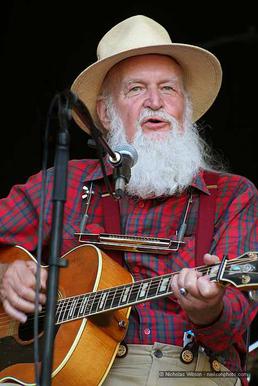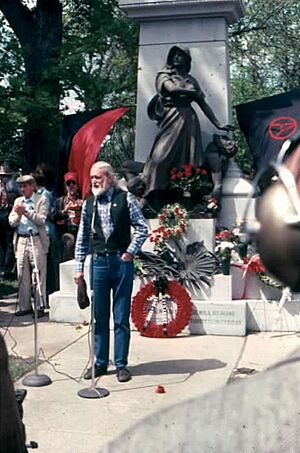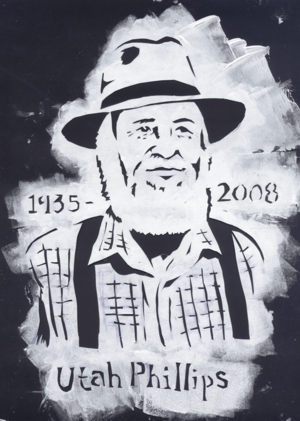Utah Phillips facts for kids
Quick facts for kids
Utah Phillips
|
|
|---|---|

Utah Phillips, 2006
|
|
| Background information | |
| Birth name | Bruce Duncan Phillips |
| Born | May 15, 1935 Cleveland, Ohio |
| Died | May 23, 2008 (aged 73) Nevada City, California |
| Genres | Folk music |
| Occupation(s) | Songwriter, performer, raconteur |
Bruce Duncan "Utah" Phillips (born May 15, 1935, died May 23, 2008) was an American folk singer, storyteller, and poet. He also worked as a labor organizer, helping workers get fair treatment. He often sang and told stories about the challenges faced by workers and how they could work together to make things better. He supported the Industrial Workers of the World, a group that worked for workers' rights.
Early Life and Influences
Phillips was born in Cleveland, Ohio. His father, Edwin Phillips, was a labor organizer, which means he helped workers form groups called unions to improve their jobs. His parents' work greatly influenced Utah Phillips. He became a member of the Industrial Workers of the World (also known as the Wobblies), a famous workers' rights group.
When Utah was five, his parents divorced. His mother remarried, and his stepfather, Syd Cohen, adopted him. Syd Cohen managed a theater in Cleveland, and later in Salt Lake City, Utah. Being around vaudeville shows (a type of entertainment with different acts) at a young age helped shape Utah Phillips's future career as a performer.
Phillips went to East High School in Salt Lake City. He enjoyed arts and plays there. After high school, he joined the United States Army for three years in the 1950s. Seeing the damage in post-war Korea made him think deeply about social and political issues. After leaving the army, Phillips traveled by riding trains and started writing songs.
A Career of Song and Story
While traveling across the country, Phillips returned to Salt Lake City. There, he met Ammon Hennacy, a kind person from the Catholic Worker Movement. Utah Phillips said that Hennacy helped him change his life from just wandering around to using his talents for helping others. Phillips worked with Hennacy for eight years at a place called the Joe Hill House, which helped people in need.
In 1968, Phillips ran for the United States Senate in Utah. He didn't win, but he showed his dedication to public service. He also ran for president in 1976 for a group called the Do-Nothing Party.
He started using the name U. Utah Phillips because it was a tradition among travelers to use an initial and their home state. He also liked how country singer T. Texas Tyler used a similar name.
Phillips met folk singer Rosalie Sorrels in the early 1950s, and they became close friends. Rosalie began to sing the songs Utah wrote, which helped his music become known to more people. Later, he moved to Saratoga Springs, New York, where he became a regular performer at a coffee house called Caffè Lena.

Utah Phillips was a strong supporter of workers' rights and unions. His parents, especially his mother, taught him a lot about these issues. He was a member of the Industrial Workers of the World (IWW). Phillips was also a pacifist, meaning he believed in peaceful ways to solve problems. He often used his concerts to share the ideas of labor unions and peace. He was known for singing classic Wobbly songs like "Hallelujah, I'm a Bum" and "Bread and Roses."
Phillips loved trains and often rode them. He recorded several albums about railroads, especially the old steam locomotives. His 1973 album, Good Though!, included songs like "Daddy, What's a Train?" and "Queen of the Rails." It also featured his famous story, "Moose ... Pie," where he told a funny, exaggerated tale about working on train tracks.
In 1991, Phillips recorded an album called I've Got To Know. He was angry about the first Gulf War and wanted to share his feelings through songs, poems, and stories. This album included "Enola Gay," a song about the atomic bombings of Hiroshima and Nagasaki.
Utah Phillips helped many other folk singers. He was a mentor to Kate Wolf, another folk artist. In 1998, he received the Kate Wolf Memorial Award. He also worked with Rosalie Sorrels on a CD called The Long Memory (1996). The famous musician Ani DiFranco recorded two CDs with him, The Past Didn't Go Anywhere (1996) and Fellow Workers (1999). He was even nominated for a Grammy Award for his work with Ani DiFranco. His song "Green Rolling Hills" became a country hit for Emmylou Harris, and "The Goodnight-Loving Trail" was recorded by many artists, including Ian Tyson and Tom Waits.
Later Life and Legacy
Besides being a performer and labor organizer, Utah Phillips also worked as an archivist (someone who keeps historical records), a dishwasher, and a warehouse worker.
Throughout his life, Phillips was part of many groups that worked for social and political change. He was a member of the Industrial Workers of the World (IWW) and other unions. He also supported homeless communities and was a member of Veterans for Peace, a group that promotes peace.
In his free time, Phillips had many interesting hobbies. He enjoyed Egyptology (studying ancient Egypt), amateur chemistry, and linguistics (the study of language). He also loved history, debate, and poetry. He enjoyed cooking, pickling, and gardening too.
He married Joanna Robinson on July 31, 1989.
As he got older, Utah Phillips became a respected figure in the folk music world. He was known for keeping old stories and songs alive that might have been forgotten. He was also an important part of the "Traveling Nation," a community of people who traveled by train. He helped preserve their history and culture.
Utah Phillips was a gifted storyteller. He often told stories during his concerts, along with singing songs. He once said that it was "better to be likeable than talented," showing his humble personality.
From 1997 to 2001, Phillips had his own weekly radio show called Loafer's Glory: The Hobo Jungle of the Mind. The show was broadcast nationally but ended after 100 episodes because there wasn't enough money to keep it going.
Phillips lived in Nevada City, California, for 21 years. There, he helped start the Hospitality House, a shelter for homeless people, and the Peace and Justice Center. He felt Nevada City was a great place for community work.
In August 2007, Phillips announced he would have a heart procedure. Later that year, he said his health problems meant he could no longer tour. By January 2008, he decided against a heart transplant.
Utah Phillips passed away on May 23, 2008, in Nevada City, California, due to heart problems. He was 73 years old. He is buried in Forest View Cemetery in Nevada City.
Discography
|
Solo albums
|
Other albums
|
 | Claudette Colvin |
 | Myrlie Evers-Williams |
 | Alberta Odell Jones |


